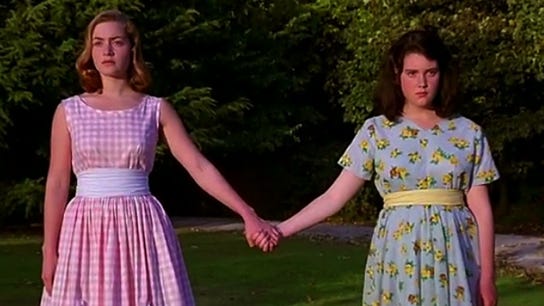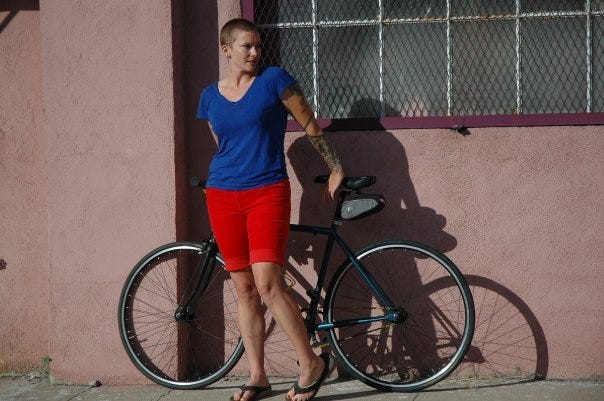I’ve been wanting a breast reduction since I was thirteen years-old. Smaller boobs. Tiny boobs. Almost nonexistent boobs. I dreamed and still dream of them. My breasts have always felt like appendages hanging from my chest, attached by superglued suction cups. I’ve had dreams about slicing into them, carving them away from my breastbone, and throwing them off a cliff into the ocean.
I always considered this superficial. There was something wrong with me, to not want this body part so many women paid good money to install beneath their skin. But now I know it’s gender dysphoria, and the urge has only grown stronger. On some days it’s intolerable. That I don’t identify as a man, and don’t want my breasts completely removed, means I will never get insurance coverage. So my quest to save ten thousand dollars continues.
There are other things about myself I dislike in a more traditional sense. For instance, I have an ambivalent relationship with the frown line between my eyebrows. It’s been there since I was a teenager, a product of my perpetual unhappiness and escape planning. I used to stand in front of the mirror and practice my brow furrow. If I got good enough, no one would bother me and no one could hurt me. I wanted to look mean, though truthfully I was very soft, and not mean at all. I’d learned very young that being nice wasn’t safe. My furrow, and the expression and vibe that came with it, kept me safe, or so I thought.
So now I have a crease. The other day I saw someone in their twenties post about their eyebrow crease. Should I get botox? they asked. And I in turn asked myself, Should I get botox? It’s not like I don’t think about these things— I mean, I’m forty. I’ve thought about botox and restalyne and juvaderm and all that shit that’s supposed to keep our skin taut and youthful. But I won’t get botox. I won’t pump fillers into my precious dermal layers. Because my furrow says a lot about me. What it says can be misinterpreted by others, as so many appearances are, but it’s part of my history, just as my tattoos are part of my history (even the ones I deeply regret). History can be uncomfortable.
I’ve been of the “I’ll never get fillers or plastic surgery” camp since I was pretty young. It’s not that I’m not afraid of losing my beauty (read, youth) but that I refuse to accept and fully ingest a culture that has criticized my appearance me since I was an actual child. I refuse to perpetuate it, and I refuse to inflict the harm onto others.
Why would I do what that culture wants me to do?
Why would I spend my money, the capital I earned with my body, brain, and time, on chemicals and inserts that create a (supposedly) more desirable facade to satisfy our terribly superficial culture?
To me, this is criminal. The fact that we are brainwashed into thinking that the “happiness” we feel when we’re using a new product or when we remove the expression from our forehead is actual happiness, and not superficial, just as the fillers and freezers themselves are. Our environment will age us. Our lives will age us. And if they don’t, we may not have been living at all.
For decades I’ve been saying it’s ok for others to get plastic surgery, a la Kardashian. And it is, of course. But I’d be lying if I said it didn’t make me sad. Not just sad. It fills me with despair to metabolize the reality of it: that focusing on preening and surgically “enhancing” our exteriors, we continuously fail to fully regard our interiors and the depth of feeling and intelligence we possess. And in turn, we disregard the same in others. And we influence the perceptions of everyone in our orbit. Again, using the Kardashians as an example, we can see their influences everywhere. Some of us may dislike them, but they are our reflections, too.
If I am lucky I will have my breasts chopped off. That’s the only plastic surgery I want.
When I was thirteen, I began cutting women out of magazines. Models, actresses. I’d been collaging for a few years but this was different. I carefully trimmed the lines of their waists and heads and gave them each their own page in my journal. They floated there, in the white, unlined space. I still remember vividly reading an interview with Kate Winslet about the hair that she tweezed from her chin— the interviewer treated her as if she were some alternative starlet with a “real” body, just as she was treated for her role in Mare of Easttown. She was coded as chubby. I cut out her body, clad in a red velvet dress, and aimed for that, knowing that the ultra-skinny bodies of the models would never be attainable for me.

A year before, I’d begun throwing up. First, sticking a toothbrush down my throat and then, after only a year or two, simply bending over the toilet and squeezing my abdominal muscles. I didn’t know that bulimia would be a part of my life for the next two and a half decades. At this point, I have spent more of my life with bulimia than without it. It was predictable, seeing as I was raised in a household where my body was consistently objectified, where I was called fat and ugly, and where I had no control, but also, it wasn’t just that. It was our culture, too, which taught me that I must transform myself.
It took me many years (many, many years) to realize that the end point of such a transformation was like trying to find the pot of gold at the end of a rainbow, something I’d done frequently as a child growing up in the Pacific Northwest, running through the mist towards some end point that didn’t exist. I got thin, I dyed my hair blonde, I was striking and beautiful, and yet I still hated myself. I still wanted more. It was never enough.
In Sensing the Self by Sheila M. Reindl:
“A bulimic person may be so disconnected from her experience that she does not even know what she needs or wants. If she does not know, needing something or someone only confirms her sense that she is weak and inadequate. She believes her needs are not legitimate, and therefore finds it difficult to seek care or engage with any care she does manage to seek. In fact, she is likely to greet others' expressions of concern with contempt, the very contempt with which she views herself.”
I deeply identify with this, and I remember reading this book in my early twenties, when I was working as a hotshot. I still have the book, and it’s still grimy from turning its pages with my dirty hands. I wonder how many people of all genders spend years of their lives rejecting their own experiences, erasing themselves in some way or another, in order to conform to some implied standard of perfection.
Lately I’ve begun feeling sorry for thin people. Particularly the thin women who look at me with a mixture of pity and confusion when I am out in public. Since coming out as nonbinary I’ve stopped shaving, and started feeling more comfortable and confident in my body, which is the largest it’s ever been. I now qualify as “obese,” (though, to be honest, I’ve qualified as “overweight” for nearly all my life, even at my most athletic, because the BMI is bullshit).
I enjoy food now, and my diet is varied. I eat what I want, which sometimes consists of lots of veggies and fruit and sometimes consists of ice cream (I really do love ice cream). And I am more confident in my body than I have ever been. I remember when I was at my smallest (and at many other points in my life) searching people’s faces for their reaction. I saw my body from the outside, through other people’s eyes. I didn’t experience it from the inside. If I perceived a negative reaction or facial expression, that could ruin my day. If a certain number showed on my scale, I could spiral into a crisis of self.
I no longer weigh myself. I no longer search people’s faces, except maybe to see if they’re receptive to a smile or a hello. In public I feel open and okay, for the most part. Proud of my hairy legs, proud of my strong and large body, and relatively happy. I wear bright clothes. I don’t hide like I used to, and wait for attention. I don’t need anyone’s approval.
I never realized that the key to self-acceptance wasn’t in conforming to cultural expectations (which, I’ll repeat, are unattainable), but finding my own compass for what feels right to me. For what feels good. I wear things others are scared to wear, and damn, it feels so, so good. I am no longer scared of calling attention to myself because if someone pays me attention I am happy to return any affection and happy to deflect any bullshit negativity. My mood, my happiness, my joy— it is not a dial turned from the outside, by others. It’s mine.

I could mourn the years and years of my life I spent obsessing over my appearance, throwing up my food and unable to eat in a healthful way, agonizing over whether I had exercised enough to enjoy a piece of cake, and otherwise torturing myself. And truthfully, I have. I have mourned that. But I also celebrate the years I get to spend loving my body; finding my way to embodiment and a strong sense of self; spending my money on things other that anti-aging creams, cleanses, and possibly surgery or Botox or fillers. I have vowed to age honestly, just as I have vowed to live honestly, not just for myself but for my proverbial children— those in younger generations who need something real to look at, and to see that being real, being honest, being true to who you are can bring a joy and self-fulfillment that our cultural void can never lead us to.
What I’m doing:
Reading: The Years by Annie Ernaux. I’ve just started it.
Listening to this summer playlist I made.
Listening to this podcast from The Atlantic about the War On Drugs and how incredibly fucked up it is, as well as our cultural assumptions surrounding the “type” of people who use drugs (hint, most drug users are white and middle class).
Contemplating the absurdity of our constant debates about “cancel culture,” and mourning an author I once loved, who for all her intelligence doesn’t seem to be able to comprehend her transphobia.
Listening to You’re Wrong About, whose latest episode is an excellent history of “cancel culture.”
Working hard on my book.
Reading this important piece about poverty.
Watching: Sorry We Missed You, a heartbreaking and essential film about how our current culture exploits workers and leaves them vulnerable.
Reading this long piece about Amazon and how fucking terrible it is.
I injured my back a couple weeks ago and am very grateful that yoga has brought me back from the edge. Join me on Monday for class at 830am PST.




